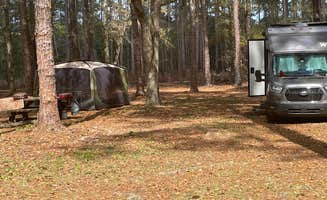Dispersed camping near Chattahoochee, Florida centers primarily within the Apalachicola National Forest, which encompasses over 632,000 acres of the Florida Panhandle. The forest contains numerous cypress swamps, pine flatwoods, and sandhills with elevation changes rarely exceeding 100 feet. Summer temperatures regularly exceed 90°F with high humidity, while winter nights can drop into the 30s, requiring appropriate seasonal gear for comfort.
What to do
Fishing opportunities: Porter Lake Dispersed Camp provides direct access to the river system for anglers seeking bass, bream, and catfish. The camp serves as a convenient base for both shore fishing and launching small watercraft. According to camper Christin P., "It's near hunting and lots of road noise from the nearby bridge but overall it's a nice overnight getaway from the daily grind."
Wildlife observation: The remote locations of these dispersed camping areas offer excellent wildlife viewing opportunities, particularly during early morning and evening hours. Deer, wild turkey, and numerous bird species frequent the areas around Buckhorn Hunt Camp. Visitor Thomas V. notes the area is "easy to find and roads in are OK. Not all that busy outside of hunting season."
Paddling excursions: The waterways accessible from Porter Lake Dispersed Camp create opportunities for day-long paddling adventures. Camper Annette L. describes, "The river is beautiful to boat or kayak and fish." Water levels vary seasonally, affecting navigability, particularly during dry periods.
What campers like
Genuine isolation: The significant distance from populated areas provides a true wilderness experience. Campers appreciate the absence of light pollution and cellular connectivity. One visitor at Porter Lake notes, "This campground is at least 30 miles either way on F13 (dirt road to campground) and other routes to any type of civilization."
Evening tranquility: After daytime traffic from logging operations subsides, the forest becomes remarkably quiet. Annette L. reports about Porter Lake, "There are a lot of logging trucks who use the road during the day and other vehicles but at night total quiet just the wildlife."
Basic amenities: Cliff Lake Hunt Camp provides minimalist accommodations suitable for self-sufficient campers. The absence of developed facilities appeals to those seeking an authentic backcountry experience without crowds or reservation requirements typically found at more developed campgrounds.
What you should know
Road conditions: Forest service roads accessing these dispersed sites deteriorate significantly after rainfall. High-clearance vehicles are often necessary, particularly for accessing Twin Poles Hunt Camp during wet periods. Roads may become temporarily impassable after heavy storms.
Facility limitations: Most hunt camps lack basic amenities. Porter Lake offers the most facilities with "vault toilets and a water spigot," according to Annette L., who adds, "They say non-potable but there are no signs." Buckhorn previously had portable toilets, but according to Thomas V., "some drunk idiots smashed them."
Seasonal considerations: Hunting seasons significantly impact campsite availability and atmosphere. During designated hunting periods (typically fall and winter), expect increased occupancy and potential hunting activity near camping areas. Check Florida Fish and Wildlife Conservation Commission website for current hunting season dates before planning trips.
Tips for camping with families
Site selection: At Buckhorn Hunt Camp, Thomas V. notes, "Four spots have a picnic table. Spots are reasonably private." These designated areas provide better organization for family camping with multiple tents or gathering spaces.
Water planning: No reliable drinking water exists at most dispersed sites. Families should transport 1-2 gallons per person per day, plus additional water for cooking, cleaning, and emergency reserves. The non-potable spigot at Porter Lake should not be used for drinking without proper treatment.
Activity preparation: White Oak Landing and Hunt Camp and surrounding areas lack structured recreation facilities. Families should bring complete activity supplies including games, nature identification guides, and exploration equipment suitable for self-directed outdoor experiences.
Tips from RVers
Size limitations: Large RVs face significant challenges on forest roads. Sites accommodate smaller trailers and campers under 25 feet, but turning radius and overhead clearance issues restrict bigger rigs. Porter Lake accommodates both "tent and RV" camping according to site information.
Ground conditions: Designated parking areas at dispersed sites lack improved surfaces. During wet periods, soft ground can cause vehicles to become stuck. Using wooden blocks or specialized leveling equipment helps stabilize RVs on uneven surfaces common at these rustic sites.
Supply planning: The substantial distance from services requires complete self-sufficiency. Christin P. describes Porter Lake as "a quick getaway from city life" but notes its remote nature, suggesting RVers should stock all necessary supplies before arrival, as the nearest resupply points may be over an hour's drive away.


